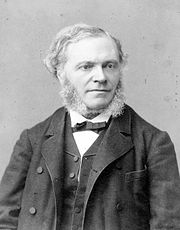
Vespro della Beata Vergine, SV 206, is a musical setting by Claudio Monteverdi of the evening vespers on Marian feasts, scored for soloists, choirs, and orchestra. It is an ambitious work in scope and in its variety of style and scoring, and has a duration of around 90 minutes. Published in Venice as Sanctissimae Virgini Missa senis vocibus ac Vesperae pluribus decantandae, cum nonnullis sacris concentibus, ad Sacella sive Principum Cubicula accommodata, it is sometimes called Monteverdi's Vespers of 1610.
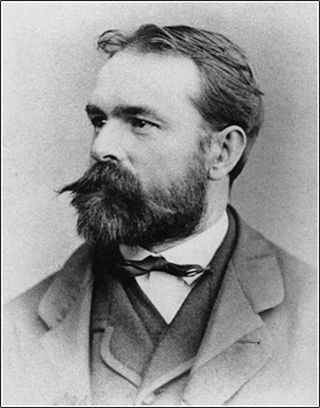
Josef Gabriel Rheinberger was an organist and composer from Liechtenstein, residing in Bavaria for most of his life. As court conductor in Munich, he was responsible for the music in the royal chapel. He is known for sacred music, works for organ and vocal works, such as masses, a Christmas cantata and the motet Abendlied; he also composed two operas and three singspiele, incidental music, secular choral music, two symphonies and other instrumental works, chamber music, and works for organ.
In religious music, the verse anthem is a type of choral music, or song, distinct from the motet or 'full' anthem.

Jesu, meine Freude, BWV 227, is a motet by Johann Sebastian Bach. The longest and most musically complex of Bach's motets, it is set in eleven movements for up to five voices. It is named after the Lutheran hymn "Jesu, meine Freude" with words by Johann Franck, first published in 1653. The motet contains the six stanzas of the hymn in its odd-numbered movements. The hymn tune by Johann Crüger appears in all of these movements in different styles of chorale settings. The text of the motet's even-numbered movements is taken from the eighth chapter of the Epistle to the Romans, a passage that influenced key Lutheran teachings. The hymn, written in the first person with a focus on an emotional bond with Jesus, forms a contrasting expansion of the doctrinal biblical text. Bach set both texts alternating with and complementing each other, in a structure of symmetries on different layers.

Johann Sebastian Bach's Magnificat, BWV 243, is a musical setting of the biblical canticle Magnificat. It is scored for five vocal parts, and a Baroque orchestra including trumpets and timpani. It is the first major liturgical composition on a Latin text by Bach.

Singet dem Herrn ein neues Lied, BWV 225, is a motet by Johann Sebastian Bach. It was first performed in Leipzig around (probably) 1727. The text of the three-movement motet is in German: after Psalm 149 for its first movement, the third stanza of "Nun lob, mein Seel, den Herren" for the second movement, and after Psalm 150:2 and 6 for its third movement Psalms 150:2,6.

Psalm 150 is the 150th and final psalm of the Book of Psalms, beginning in English in the King James Version: "Praise ye the LORD. Praise God in his sanctuary". In Latin, it is known as "Laudate Dominum in sanctis eius". In Psalm 150, the psalmist urges the congregation to praise God with music and dancing, naming nine types of musical instruments.
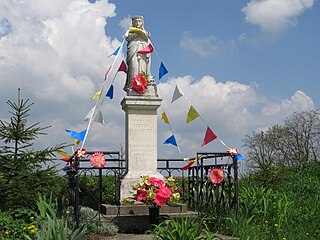
Psalm 115 is the 115th psalm of the Book of Psalms, beginning in English in the King James Version: "Not unto us, O LORD, not unto us, but unto thy name give glory". It is part of the Egyptian Hallel sequence in the fifth division of the Book of Psalms.
In convertendo Dominus, Op. 32, is the musical setting of In convertendo Dominus, written by Jules Van Nuffel in 1926 for a mixed choir and organ.
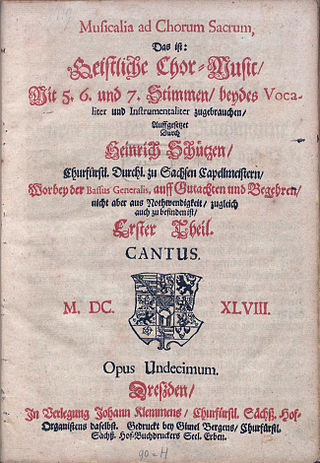
Geistliche Chormusik is a collection of motets on German texts for choir by Heinrich Schütz. It was printed in Dresden in 1648 as his Opus Undecimum, and comprises 29 individual settings for five to seven voices, which were assigned numbers 369 to 397 in the Schütz-Werke-Verzeichnis (SWV). The original title was Geistliche Chor-Music, Erster Theil which indicates that Schütz planned a second part. It is also known as Geistliche Chor-Music 1648. The collection contains earlier and new works and a German arrangement of a motet by Andrea Gabrieli.
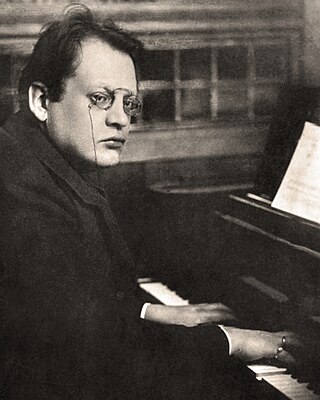
Der 100. Psalm, Op. 106, is a composition in four movements by Max Reger in D major for mixed choir and orchestra, a late Romantic setting of Psalm 100. Reger began composing the work in 1908 for the 350th anniversary of Jena University. The occasion was celebrated that year with the premiere of Part I, conducted by Fritz Stein on 31 July. Reger completed the composition in 1909. It was published that year and premiered simultaneously on 23 February 1910 in Chemnitz, conducted by the composer, and in Breslau, conducted by Georg Dohrn.

Antonio Vivaldi composed three settings of the Dixit Dominus, the Latin version of Psalm 110. They include a setting in ten movements for five soloists, double choir and orchestra, RV 594, another setting in eleven movements for five voices, five-part choir and orchestra, RV 595, and a recently discovered setting in eleven movements for five soloists, choir and orchestra, RV 807, which had been attributed to Baldassare Galuppi. It is said to be one of his "most significant sacred works."
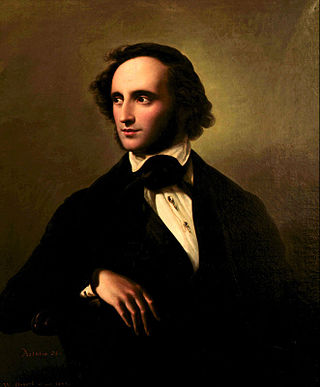
Jauchzet dem Herrn, alle Welt, WoO. 28, is an anthem for choir a cappella, a setting of Psalm 100 in German composed by Felix Mendelssohn in 1844. It was published in 1855 after the composer's death. It is the most popular setting of Psalm 100 by Mendelssohn, who also wrote a four-part motet in Latin, "Jubilate Deo", as part of Three Motets, Op. 69, in 1847 for use in the Church of England, which adds a doxology to the psalm text. He set the psalm again, but with paraphrased text by Ambrosius Lobwasser, "Ihr Völker auf der Erde all", as part of Sieben Psalmen, harmonising melodies from the Genevan Psalter.

Chandos Anthems, HWV 246–256, is the common name of a set of anthems written by George Frideric Handel. These sacred choral compositions number eleven; a twelfth of disputed authorship is not considered here. The texts are psalms and combined psalm verses in English. Handel wrote the anthems as composer in residence at Cannons, the court of James Brydges, who became the First Duke of Chandos in 1719. His chapel was not yet finished, and services were therefore held at St Lawrence in Whitchurch. The scoring is intimate, in keeping with the possibilities there. Some of the anthems rely on earlier works, and some were later revised for other purposes.
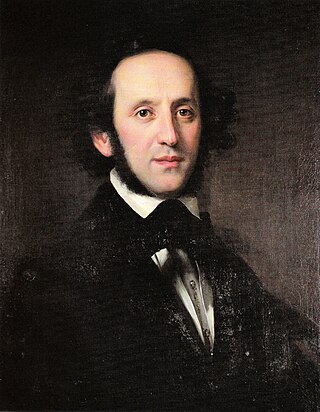
Denn er hat seinen Engeln befohlen, MWV B 53, is the incipit of a motet for an eight-part choir a cappella by Felix Mendelssohn. He wrote it in 1844 for the Berlin Cathedral, setting verses 11 and 12 from Psalm 91. Later, Mendelssohn made the motet with accompaniment part of his oratorio Elijah. It was published in 1844, and by Breitkopf & Härtel in 1875 in the complete edition of the composer's works.

Six Motets, Op. 82, are six motets for choir a cappella by Friedrich Kiel. He set selected psalm verses in German. The motets were published in 1883 by Bote & Bock, dedicated to H. A. Köstlin, as Sechs Motetten für gemischten Chor a cappella.

Pietro Torri's Magnificat in C major for double choir and orchestra likely dates from the 1690s. The work is scored for two SATB choirs, two trumpets, bassoon, strings and basso continuo. Its music opens with an instrumental introduction (sinfonia). Most of the composition's movements are either choral movements, in which all singers and instruments participate, or duets for two singers and a more limited instrumental accompaniment.

Verleih uns Frieden is a chorale cantata by Felix Mendelssohn, setting a prayer for peace by Martin Luther. Mendelssohn composed the short work in one movement for mixed choir and orchestra in 1831. It is also known as Verleih uns Frieden gnädiglich.

Drei Motetten, Op. 39, is a collection of three sacred motets for women's voices and organ by Felix Mendelssohn. Composed in 1830 for different liturgical occasions and in different scoring, they were published together in 1838.
Salmo 150 is a psalm setting by Ernani Aguiar. He wrote the composition, setting Psalm 150 in Latin for unaccompanied choir, in 1975. The short work was published by Earthsongs in the U.S. in 1993, and achieved international popularity.
